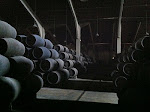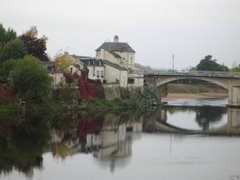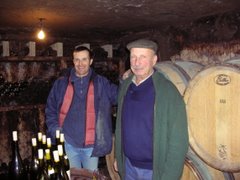Two Kinds of Ripe
Lars Carlberg recently left another informative and interesting comment on this blog, this time to the post on Domaine Tempier's 1994 Bandol. Lars, Mosel wine exporter, wine lover, and wine thinker extraordinaire, lamented the fact that alcohol levels are consistently higher now in so many wines from Bandol and Châteauneuf du Pape.
Alcohol levels are typically at least 14% now in wines from those places, regularly hitting 15%. Until a decade ago, alcohol levels were typically about 13%. That increase of 1-2% represents 10-15% more alcohol in the wine, a significant increase. Why has this happened? I do not have a definitive answer for you, but Lars talked about phenolic ripeness and I want to explain what I think he meant - it's an interesting and counter intuitive idea.
First of all, the amount of sugar (measured in Brix) contained within grapes determines the potential alcohol level of the resulting wine. Bandol reds and also those from Châteauneuf du Pape, like most red wines, are fermented until dry. If alcohol levels are higher now, then it seems clear that grapes are now picked at sugar levels that are higher than they used to be.
Why would there now be more sugar in Bandol and Châteauneuf du Pape grapes? Perhaps it was a collective decision to pick later, encouraging maximum ripeness. But I don't think that's the answer. There are wine regions in which the prevailing style is to leave the grapes hanging as long as is safe to do so, producing ultra-ripe grapes that in turn produce huge, fruity, high alcohol wines. I don't think that's what they're going for in Bandol or in Châteauneuf du Pape.
So what's else could be behind the increase in alcohol levels if it's not a conscious decision to pick later? Well, it turns out that there are two types of ripeness. Sugar ripeness, but also something called phenolic ripeness. As Jamie Goode's describes in an excellent article that goes into far greater detail than I do here:
Phenolic ripeness (also referred to as physiological ripeness) refers to the changes in the tannins that occur in grape skins, seeds and stems. Sugar ripeness refers to the breakdown of acids and accumulation of sugars.The tannins in grape skins, stems, and seeds have to be ripe in order for wine to taste and feel right in your mouth. Under-ripe tannins can taste green and astringent, unpleasant. But sugar ripeness happens earlier than phenolic ripeness. So grapes that hang for a long time and achieve ultra-ripe sugars also achieve very good phenolic ripeness. Think of that California fruit bomb that exhibits loads of fruit and almost no structure.
It's warmer than it used to be, so shouldn't ripeness occur earlier? Sugar ripeness - yes. Phenolic ripeness, not necessarily. What if grapes achieve sugar ripeness before phenolic ripeness is achieved? The grower must then either pick early, perhaps making wine with astringent tannins and a green streak, or must allow the grapes to hang longer, achieving higher sugars and wines of potentially higher alcohol. This is what I imagine is happening in Bandol and in Châteauneuf du Pape, and in other hot weather wine regions too.
Global warming, as GW Bush said, is a load of hogwash spread around by environmentalist pagans. That wisdom notwithstanding, harvests that used to happen in late September and into October are now complete by mid September. In Bandol they're getting the right sugars, but they cannot pick grapes with unripe tannins. The wines are already notoriously tannic - imagine a big Bandol with unripe tannins. So they have to leave the grapes for longer than they'd like, and the wines are higher in alcohol.
Perhaps they will start making off-dry wines in Bandol and Châteauneuf du Pape, in order to bring the alcohol levels back down. Or perhaps they will plant different grapes that require more sun in order to ripen. Or perhaps, truly fine red wines made from Mourvèdre, Grenache, Cinsault, Syrah, and the other southern grapes, will in 30 years be coming from the more northerly climes of Beaujolais and Burgundy. Or perhaps producers in Bandol and Châteauneuf du Pape will be forced to start de-alcoholizing their wines, and using all sorts of other unnatural processes in order to make balanced wine.
None of this seems good. I'm buying hillside land with good exposure in Scotland and Greenland. Anyone want in?







11 comments:
You've got the right idea about your land buys, but check those soils.
No one seems to test residual sugar levels in wines. Maybe the Lab Director could give it a try.
Global warming, as GW Bush said, is a load of hogwash spread around by environmentalist pagans. hat wisdom notwithstanding, So, because it's "inconvenient" for George's friends, it's "hogwash"? Yet Global Warming is a fact, as what, 999 out of 1000 environmental scientists and "more than 45 scientific societies and academies of science, including all of the national academies of science of the major industrialized countries" agree.
So, what the heck you talkin' about?!
You did not mention, but another big factor thought to have caused the huge rise in alc. levels is the (re)planting of vines using clonal stock that produces higher alc. wines.
Those 1966 Burgs and Rhones that are so great just aren't made/cannot be made anymore. Very sad. Very sad indeed.
There's also a lot of discussion of viticultural and wine making practices that raise ripeness levels.
Two areas that don't seem to have been effected are Champagne and Muscadet.
You surprised me with this post. I appreciate the kind words, but I'm no "wine thinker extraordinaire." Anyway, I do feel there has been a conscientious policy among some domaines in Châteauneuf-du-Pape, as well as in other classic wine regions, to harvest later in order to make bigger, riper wines for Parkerites. In Châteauneuf, these are often the special cuvées. Certain local oenologists advise their clients to make the wines this way, which also includes more destemming than in the past. On the other hand, there are some very good and authentic cuvée spéciale as well.
Jack brought up an excellent point in regard to certain clones producing higher alcohol levels. Ulli Stein, one of our growers on the Mosel, pointed out to me that his ungrafted, old vines reach full physiological ripeness at much lower sugar levels than most clonal vines. In Châteauneuf, however, many of the overripe and over-alcoholic wines are made from old vines.
Next weekend, I'll be in Paris to meet Mark Williamson, also a longtime Rhône fan. He was telling me a story once that one of the Armenier sisters at Marcoux felt that maybe they need to plant more grapes such as Counoise, because Grenache tends to be higher in alcohol, sometimes exceeding 15° in recent vintages.
Jack - i was being sarcastic in the post. i disagree with GW Bush on global warming, and on pretty much everything. we both like baseball though.
TWG - i imagine that it's much easier to control alcohol in Champs via wine making process. muscadet, like the loire, seems not to be rising. although i've noticed some high alcohol savennieres lately.
hey lars - yes you are. and thanks for all of your comments.
I agree with Neil, Lars. Yes, you are.
This is another great, educational post.
TWG, you probably already know that if you dig down to the technical notes that some (but not all) producers/importers provide, you often do get information about brix at harvest and RS on bottling. It's probably not a hard and fast rule, but I'd say if a producer is willing to share this data, they're not likely to be spoofing their wines to conform to contemporary palate habits. Which is a good starting point to motivate purchase for me.
I think this is an issue in Champagne as well (let's ask Peter, he'll know for sure!). There's only so much you can blend away. And the growers that Neil favors are not likely to be using reverse osmosis to reduce alcohol levels (which is why I favor them too).
I read somewhere recently but can't remember where, about producers who were experimenting with trellising and sun exposure to promote phenolic ripening that better matches sugar ripeness.
But they must be nuts. Parker'll never go for that.
cheers (thell)
I know not the point of the post, but I think no one, not even the so-called global warming deniers, claim that the last 20 years were not hotter than the previous 20. The question is whether this was caused by human activity, which I think, is far from certain. Just my 2 cents. This is not in any way to be construed as a defense of George Bush in any way whatsoever. He is beyond defense.
It's warmer than it used to be, so shouldn't ripeness occur earlier? Sugar ripeness - yes. Phenolic ripeness, not necessarily. What if grapes achieve sugar ripeness before phenolic ripeness is achieved? The grower must then either pick early, perhaps making wine with astringent tannins and a green streak, or must allow the grapes to hang longer, achieving higher sugars and wines of potentially higher alcohol. This is what I imagine is happening in Bandol and in Châteauneuf du Pape, and in other hot weather wine regions too.
There certainly is evidence that riper wines get higher scores and more dollars.
Is there any evidence that the acceleration of phenolic ripeness lags sugar ripeness?
I think that this falls under the category of, "when you hear hoofbeats, think horses, not zebras."
Zebras?! Where are the zebras?
I'm thinking in the Rocky's- like Colorado or Wyoming, I mean- why not, the soil is basically rock. The wines should be good in about 100 years!
B.
Great article. This is our struggle here in Sonoma, where as fledgling winemakers, we are attempting Southern Rhone style varietals. The ripeness equation is the biggest challenge. Especially if you are not a fan of Parker Fruit Bombs.
And yes, talk to any farmer around here (and the great winemakers are first and foremost farmers) and they'll tell you Global Warming is a bitch.
Post a Comment